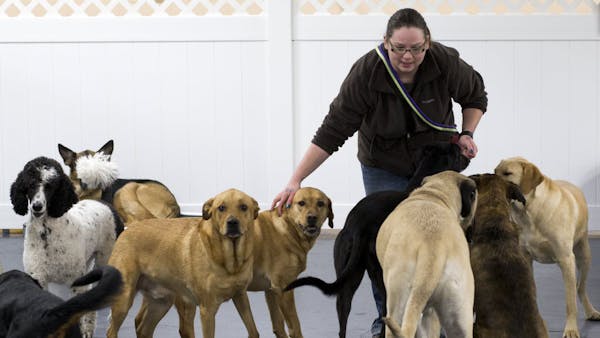Minnesota dog owners, pet day care operators and veterinarians are bracing for a highly contagious dog flu that is sweeping across the Midwest and has already killed several pets from Ohio to Wisconsin.
So far, there have been no reports of the canine influenza in Minnesota, but experts say it is nearly certain to strike the state before the virus subsides. Already more than 1,100 dogs in the Chicago area are fighting the virus — with six dead — and local canine caregivers are preparing for its spread north.
"We don't really know when the end of this outbreak is going to occur, so we need to continue to have heightened awareness," said Jennifer Granick, an assistant professor of veterinary clinical sciences at the University of Minnesota. "We need to make sure we have all of our protocols in order so that if and when we do see cases here, we can handle them."
Dogs facing the greatest risk for exposure are those in kennels, shelters, dog parks and at animal day care facilities — areas where lots of dogs congregate, experts said.
Local officials are already urging dog owners to limit contact between their canines at dog parks and other places where pets gather. Experts also urged pet owners to limit nose-to-nose contact between unknown dogs and immediately see a veterinarian if you think your dog has contracted the flu.
Mildly affected dogs experience coughing and sneezing about a week after they swap fluids with an infected pet. More extreme cases bring a lack of appetite, vomiting and, in the worst cases, pneumonia. All breeds and ages are susceptible to the flu. And even though it is called canine influenza, it can be transferred to cats. So far, there have been no reports of it spreading to people.
Besides living in canine respiratory tracts, the virus can survive on fabrics and hard surfaces, hitching a ride from pet to pet.
The virus is almost identical to a canine influenza strain that surfaced over the last decade in 30 states. The virus originated in Asia and scientists were able to create a vaccine against it.
But researchers say they don't know whether the same vaccine will fight the virus that's causing the latest Midwest outbreak, prompting new laboratory work to give veterinarians the best chance at prevention.
"The virus strain that is in Illinois is not one that there is a vaccination for at this time, so we don't know if it's protective or not," said Dr. Cynthia Fetzer, Camden Pet Hospital owner and veterinarian in Minneapolis.
Most Twin Cities animal care centers are equipped to offer treatment, Fetzer said. And if cases did arise in Minnesota, veterinarians would follow infectious disease protocols, such as isolating highly infectious dogs and using adequate protective gear to limit the virus' exposure.
"It's good to be vigilant, but nobody should panic at this point," Granick said.
In Chicago, Granick said, canines received medical treatment by specially appointed clinicians in parking lots to avoid transmission in facilities' lobbies and patient rooms.
The potential outbreak is causing animal owners to make plans in case the virus hits closer to home.
Piper is a doggy day care regular. Canine baby-sitters watch the three-year-old yellow Labrador each week.
Piper's owner, Laura Paulson, said she is not worried about her Lab's hangouts at Metro Dogs Daycare & Boarding.
Paulson said she is encouraged that staff members regularly wash equipment, provide updates on emerging diseases and ensure safe dog-to-dog contact.
But Paulson said she always makes sure Piper isn't "overly friendly" in new settings where there's a higher risk of picking up a bug from an unfamiliar four-legged friend.
"If it was a big outbreak here, we'd definitely curb our public outings," she said. "We would probably not attend dog parks, just because we have alternatives."
Experts are advising shelter and pet owners to research the paths adopted pets are taking to Minnesota. If caregivers don't properly quarantine or test an animal after its trip across state lines, the viral infection could go unnoticed and spread quickly, Granick said.
Minneapolis Animal Care and Control program coordinator Jeanette Wiedemeier Bower said that compared to other areas, Minneapolis is extremely dog-friendly, making it an attractive destination for dogs needing adoption from around the country.
So with the heavy canine traffic, she said, it is important veterinarians and owners give dogs the proper evaluations and treatments once the animals make it to the area.
"It's just a matter of time before it gets to us," Wiedemeier Bower said.
Jessica Lee is a University of Minnesota student on assignment for the Star Tribune.
Jessica Lee • 701-425-2302

Minnesota Sports Hall of Fame: A class-by-class list of all members

This retired journalist changed professional wrestling from Mankato

